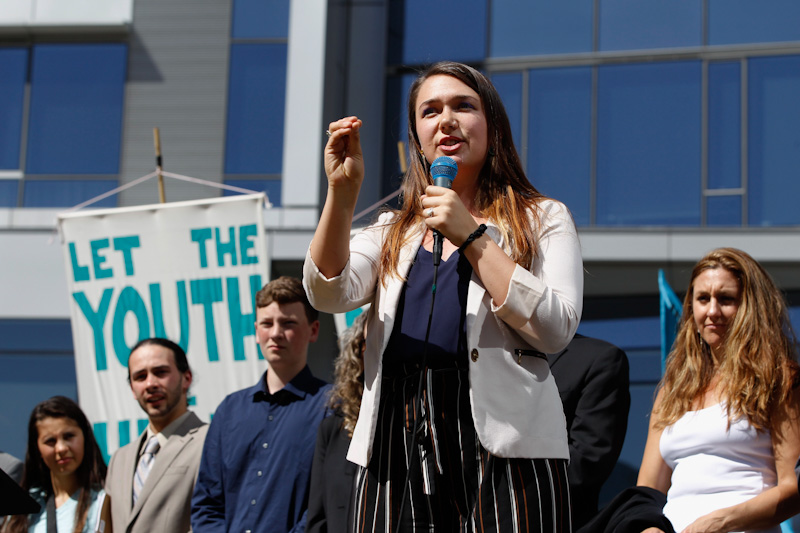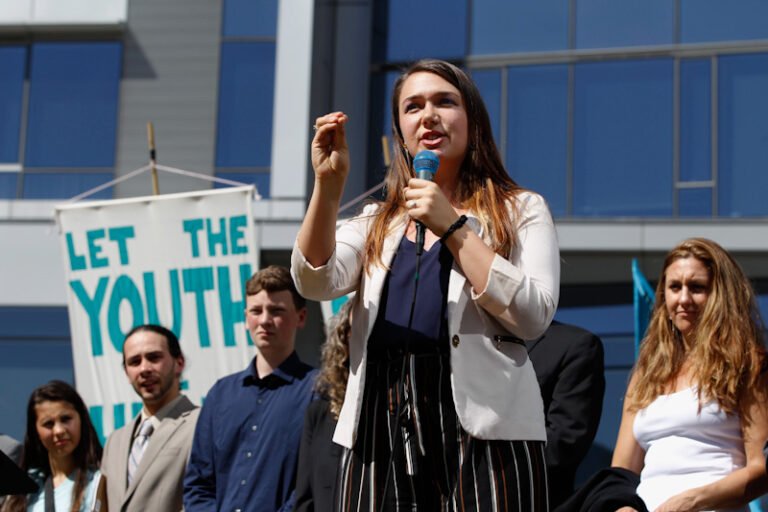Environmental Law
Federal judge’s decision tossing youths’ climate lawsuit had ‘silver lining’

Kelsey Cascadia Rose Juliana of Oregon, the lead plaintiff in Juliana v. United States, speaks at a rally in June 2019. (Photo by Steve Dipaola/The Associated Press)
A federal judge had some good news for 22 youths in his Oct. 15 decision dismissing their lawsuit seeking to block President Donald Trump’s executive orders promoting fossil fuels.
The opinion had a “silver lining,” the New York Times reports, because it concluded that the youths had shown that climate change presents “a children’s health emergency.”
U.S. District Judge Dana L. Christensen of the District of Montana had a two-day hearing before tossing the suit because of similarities to Juliana v. United States, an unsuccessful climate change suit filed on behalf of 21 youths that sought an order requiring the government to phase out fossil fuel emissions.
The hearing in the new suit, Lighthiser v. Trump, was the first time that youth plaintiffs in a climate change suit testified live in federal court, according to an Oct. 20 press release announcing that an appeal has been filed.
The 9th U.S. Circuit Court of Appeals at San Francisco dismissed Julianna because of lack of standing in a 2020 opinion that said the issue should be taken to the political branches of government. Juliana and Lighthiser were filed on behalf of youths plaintiffs by the nonprofit group Our Children’s Trust.
Christensen concluded that the Lighthiser youths “have presented overwhelming evidence that the climate is changing at a staggering pace, and that this change stems from the rise in atmospheric carbon dioxide, caused by the production and burning of fossil fuels.”
He said at least some of the youths’ claimed injuries were concrete and particularized, and those injuries were sufficiently tied to the challenged executive orders to show causation.
But Christensen saw issues with redressability. It is unlikely that declaring the executive orders illegal would revert U.S. energy policy back to the day before Trump began his second term in office, and it would not necessarily invalidate all implementing regulations, he said.
Christensen also cited concerns about the power of federal judges to create environmental policy. Granting the requested injunction would require the court “to monitor an untold number of federal agency actions to determine whether they contravene its injunction. This is, quite simply, an unworkable request,” said Christensen, an appointee of former President Barack Obama.
The New York Times spoke with Patrick Parenteau, a professor emeritus at the Vermont Law and Graduate School, who wasn’t surprised that the case was dismissed. But he said Christensen’s decision was groundbreaking because it would help build the law on climate change as it affects children.
“No other U.S. court decision has gone this far,” Parenteau told the New York Times.
Taking a new tack, Our Children’s Trust filed a petition last month with the Inter-American Commission on Human Rights on behalf of former Juliana plaintiffs. It argues that the United States violated international law by violating their right to access to justice and an effective remedy.
Write a letter to the editor, share a story tip or update, or report an error.

